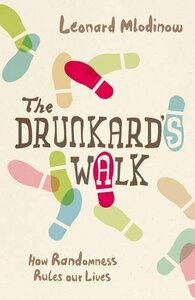Take a photo of a barcode or cover
funny
informative
lighthearted
fast-paced
I read this for book club. I liked the second half more than the first half. The history of mathematics was actually really interesting. And I enjoyed some of the real life examples of statistics and probability. If you're super interested in math and probability, this is the book for you. However, if you're hoping he comes to some grand conclusion about how understanding probability can help you in life, you're out of luck.
If you only plan to read one book about the basics of probability and statistics (including its rich history), about the impact of chance events on our lives, and about our wrong-headed attitudes to success and failure, let it be Leonard Mlodinow's "The Drunkard's Walk".
I really cannot say enough great things about this book. Engaging, informative, surprising, even funny! I'm just so impressed with its accessibility -- given the wide breadth of information it covers. He does such a good job making all the information relatable. It really made me think about the way I view the world. BONUS pro-tip: If they're trying to make you read a dumb "business book" at the office, see if you can get them to agree to read this one instead ;)
Great start and discussion of randomness, last few chapters seemed to be an eclectic collection that was hard to link to the main topic (though interesting).
really good. very mathy but in an interesting way. definitely should be read by everyone
Despite the seemingly highly rated reviews this book has received, I suspect it is more of a case of this book was hard to read which means it must be good that accounts for its ratings rather than any credit to the author's writing.
The Drunkard's walk, despite Mr. Mlodinow's attempts at following Mr. Gladwell's formula, does not succeed in copying Mr. Gladwell's easy to read voice as well. First of all, although the subtitle SAYS "how randomness rules our lives," I actually found the book to be propogating the exact opposite, our lives are actually ruled by probability and math and not random at all. Second, there was no actual connecting theme in this book. It was a collection of the most random assortment of math stories that all seem to take place sometime in the 19th centuries. They were about bizarre discoveries or how math affected people's lives, I'm not exactly sure what randomness had to do with anything other than the stories did seem to be told by a drunken man.
The writing was not easy, although if it was because it was about math and required extra concentration on my part, I apologize for that. I had to reread several chapters a few times in order to understand what Mr. Mlodinow was saying. I'm not exactly sure why his book was ordered in the way it was, nor do I understand how this became a book to begin with.
The subtitle would be better renamed: 10 odd stories about math in people's lives and how none of this will affect you.
Well. I'm glad I'm done with that book.
The Drunkard's walk, despite Mr. Mlodinow's attempts at following Mr. Gladwell's formula, does not succeed in copying Mr. Gladwell's easy to read voice as well. First of all, although the subtitle SAYS "how randomness rules our lives," I actually found the book to be propogating the exact opposite, our lives are actually ruled by probability and math and not random at all. Second, there was no actual connecting theme in this book. It was a collection of the most random assortment of math stories that all seem to take place sometime in the 19th centuries. They were about bizarre discoveries or how math affected people's lives, I'm not exactly sure what randomness had to do with anything other than the stories did seem to be told by a drunken man.
The writing was not easy, although if it was because it was about math and required extra concentration on my part, I apologize for that. I had to reread several chapters a few times in order to understand what Mr. Mlodinow was saying. I'm not exactly sure why his book was ordered in the way it was, nor do I understand how this became a book to begin with.
The subtitle would be better renamed: 10 odd stories about math in people's lives and how none of this will affect you.
Well. I'm glad I'm done with that book.
The title promised more than it delivered for me. Many times in making his point the author would start with a simple enough premise and end with a complicated conclusion. I thought he did a poor job of bridging mathematical gaps.
Very well written book on chance and probability. Not a continuous read and I have been reading it for months - bedtime reading with Ishir mostly between other books. Weird thing - the ebook I am reading has 482 pages and this one is saying 252 total?




